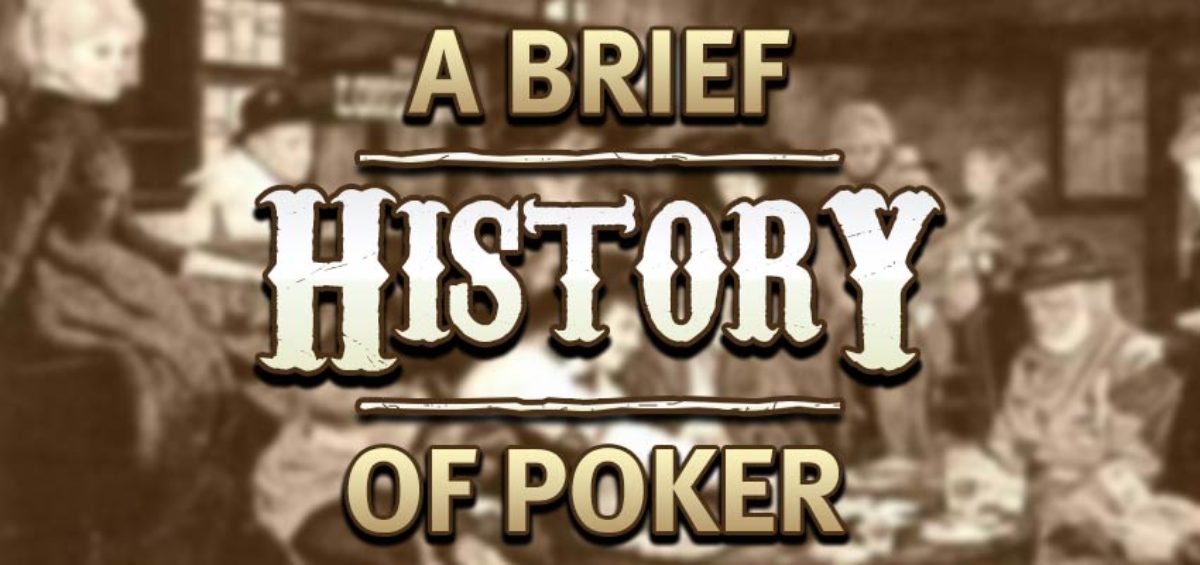A Brief History of Poker
- Posted on
- Posted Under Смішні факти та історії

Unlike a history of poker in briefs, thoroughly covered in our strip poker dressdown, this will be a compendium as concise as the facts and tugged strands permit. Regular readers will have already noted my penchant for the past. Even in the Omaha strategy articles I like to digress into historical dreamscapes. After all, he who controls the past controls the future.
We’ve done a whole series recounting the sordid misdeeds of frontier characters; maniacs like Lottie Deno, known as Madame Moustache, or Poker Alice who had Henry VIII sweating over his spousal record, but this time we’re diving deep on the origins of the great game.
Before the US civil war, before steamboat pasteboards, mining camps and the jangling pots of golden-eyed prospectors, before the great martial exodus spread poker the length and breadth of the contiguous united states, transforming a parlour room game heretofore confined to the brothel rooms of the deep south to a game which one day defined some mysterious scion of the American character, back to a wilder epoch.
Without a fixed starting point to work from, poker inherits a mythic quality. Like the discovery of fire, we imagine this is some game given us by a higher power, a game to settle Godly disputes fallen into mortal hands, Prometheus’ hand or delivered by mischievous Loki.
Murky Origins
Searching for poker’s origin is akin to bottling lightning, splitting myths to the truthful vein or doing that rock hard lightning avoidance task on the Thunder Plains in Final Fantasy X to get Tidus’ celestial weapon. Without a single Eureka moment to work from, we must instead inspect the various theories put forth by academics and game historians and decide which explanations seem most historic.
The name poker comes from poque, a game played in Louisiana and other port cities in the early 19th century, inherited from Persian sailors, descendents of conquerors, who could never have guessed the importance of the seeds they had sewn.
Lineage
Kings have manipulated mythology to bolster their legitimacy since the advent of monarchy in the lost dusts of pre-Babylonian antiquity. Archaeologists have uncovered lists of kings preserved on cuneiform clay tablets listing dynastic records stretching back thousands of years, claiming descendancy from heroes and mighty persons of renown, even Gods. Today, we will extend the same courtesy to the game of poker. I will attempt to draw parallels between the games of antiquity, of the medieval period, of the postbellum United States, right through to the game of today we all know and love, through all it’s myriad shifts, changes, iterations, slumps, soars, heroes and villains.
When in Rome
At the height of imperial Rome, games of chance were banned by law, at least in writing. On certain holidays, such as the Saturnalia, Rome’s equivalent of Bikini Bottom’s opposite day when Emperor’s served slaves and in turn their slaves reclined on palanquins draped in finery and were fed the finest vined grapes. King for a day had never been truer or crueller. Social norms were ignored during holiday periods, including gambling bans. If that old time machine in the shed is still humming, that’s the date to shoot for.
As-Nas
Remember As-Nas? The Gungan leader from Star Wars. Brian Blessed was there. Sure, you remember.
Until the early 90s, it was considered gospel that poker had developed or reached it current form by mutating As-Nas, a Persian card game, corroborating reports of Persian sailors teaching American locals to play. That was until new reports surfaced claiming a deeper connection to European games Brelan and Primero which existed around the same time or before the development of As-Nas.
Such claims are considered unhistoric, with any parallels drawn being related exclusively to the use of cards during play. This is useless as a metric in this particular endeavour because any number of games involving cards that existed pre-1800 could be dubbed patient zero. In order to find it’s true origins, we must find the origins of the betting structure. There’s better scholars than me out in the world with access to the keenest resources who have yet to make a connection between games in the past and current betting formats in poker. Given the relative complexity of poker’s betting rounds, it’s an interesting school of thought, implying that rather than building upon a core concept to reach a high-level of intricacy, the betting structures were created much as they are now.
Despite the sketchy historicity of parallels between Primero, Brelan and As-Nas, it can’t hurt to have at least a passing knowledge of how these games work and how, if at all, they factor into the development of and current landscape of card gaming.
Primero
Primero means uno, one, single, with little room to mingle. Primero, as the name suggests, is a game of Iberian origin, with existing name variants in Spanish and Italian. Long considered the noblest card game, many of the 16th and early 17th century ruling classes practiced this game in pursuit of a classy outlet for their aristocratic degeneracy. Falstaff himself, the Bard’s greatest creation according to rotund genius and sled expert Orson Welles, claims he has never prospered despite forswearing for Primero.
That’s not the only reference to Primero in Billy Shakelance’s ouvre either. It’s also included in the Merchant of Venice, although as a poker creation theory, ones involving Primero aren’t worth jot of your consternation (or Christian blood). As with poker, you have to make the best hand to win or bluff well enough to dissuade your noble counterparts from betting against you. Again, many similar games of bluff and chance existed across the globe during this time period, with each country having national and regional variants, but an in-depth study of Primero does not help illuminate the enigmatic origin of poker’s betting rounds.
Brelan
Brelan is another game which shares its roots with the aforementioned Iberian iteration. Brelan was played by the great houses of Europe around the same time as Primero, between the 1600s and 1800s, although records exist from 1458 mentioning it by name. Primero was first to fall from popular favour – always number one.
Pokerrace to the Pokerplace, right through to Gaga’s Pokerface
Really, poker’s grubby mitts started making a grab for the mainstream in the immediate wake of the American Civil War. Soldiers, with time aplenty for dossing between violent melees, would sit and gamble to wile away the long hours camped under the judgemental sky. After the armistice, soldiers returned to docile civilian lives as shopkeepers, barkeeps, horsemen and farm labourers, spreading the great game of poker along the steamer routes from Mississippi to the mainstream.
Since this initial surge in popularity, myriad changes have taken place; hold’em usurping stud as the most-played variant, the invention of video poker and eventually online poker, the boom years and everything after, right the way up to GGPoker’s opening day.
Many strange characters were attracted to the thrill and pomp, machiavellian schemers seeking outlets for their treachery – one assumes Grima Wormtongue would have much enjoyed such a game during his time in the hall of Theodon – but poker soon acquired a reputation as a game for outliers, outlaws and brigands. A dangerous game where lead replaces gold in the flick of a wrist, doubtless proceeding from its reputation as brothel entertainment and a pastime for roughshod soldiers.
Trending
Twitter came later, but poker has been trending from the gate. Written records exist of games resembling poker in play and loosely in betting since 1400, with a surge in the popularity of games post-1600, around the time of the great reformation.
Records of poker, called poker and played basically the way it is today, exist in military records, letters home from the frontlines and various frontier folklores. The earliest record of the word poker is contained in J. Hildreth’s Dragoon Campaigns to the Rocky Mountains. I managed to find a free scan online, it’s most likely a pricey antique if you want a hardcopy, containing a reference to one M, possibly a major or a name redacted for the purpose of writing home, losing hundreds at poker in camp the previous night; I know that feel, M.
Future Sound of Poker
Developments in the 1970s, namely a surge in the popularity of casino tournament poker after the virginal World Series events, meant poker loomed large in the minds of the populace. Despite a popular streak dating back two centuries, its present is more glamorous than its past.
Today there’s tonnes of options for those inclined; casino games, online tournaments, live tournaments, ultra-high stakes with the 1% in the casinos in Macau and Nevada, ultra low-stakes, video poker, branded strip poker variants, novelty cards from porn to pop stars like a deck of unwieldy Top Trumps, mobile apps, side games and of course, the single greatest innovation in the history of poker, moreso even than the tireless work of those trudging troopers teaching tirelessly the trade of their triumphs in returning victorious from the war, minus an inch or two off the side; the advent of online poker.
Welcome to the Internet. What kind of pokers can I get you here today?
Online pokers please, vinegar steaming off the rapidly-staining bag. Crawling from the primordial soup of the early internet, the first online poker sites like IRC Poker and later Planet Poker arrived, like overly baggy jeans and first caustic wails of grunge, in the 90s. Planet Poker differed from its predecessors by offering real money games, unlike IRC poker’s, which despite monopoly money denominations attracted poker’s best known faces, including Chris Moneymaker of later Full Tilt fame.
Online poker is likely responsible for more people becoming interested in the great game than any other development, aside from the initial wildfire spread of the game waybackwhen. The advent and growing popularity of online poker in the mainstream was unassailable and uncontrollable, leading to the glory years of the mid-2000s, when many of poker’s most revered names found themselves replaced, or at least the fields equalised, by relatively unknown players and upstarts from the online world. Looking at you Isildur, heir of Elessar.
PokerStars is currently the world’s largest poker room, boasting enormous social media followings, famous advocates and influencers, including a laundry list of world-famous comedians, sports stars and celebrities. Not if we have anything to say about it
The future
The future of online poker is hard to predict. The past years have seen various poker rooms arrive with a blast, burn through the cash and then fold at the first hurdle. The industry has more ups and downs than a pro Omaha game! Volatile is not the word. We can never know what’s ahead, even if we like to tell ourselves sweet little lies, but trust me when I say the best place to see the future is right here.
Well, is there more or less than you thought there’d be? Poker has a long and storied history that we’ve barely scratched the surface of, and without even a mention of its more infamous adaptees. If you’re interested in these shady characters, greedy gangsters, inspirational upstarts or soon-rich savants, here’s a list of our previous Poker in the Past articles, which might tickle your historical funny bone:
And with that, I bid you adieu. This one came out longer than the title might indicate, but the tale very much grew in the telling.
Until the next one…
Mike at GGPoker















